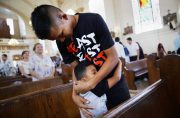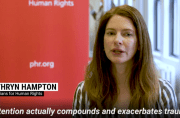Asylum
The United States is the largest recipient of asylum claims among industrialized nations. Victims of persecution and torture who come to the United States may apply for asylum and protection under the UN Convention against Torture in order to remain in the United States legally and avoid deportation to countries where they may be harmed.
For more than 20 years, PHR has been at the forefront of protecting the right to live in safety. The Asylum Program’s unique model provides direct service to asylum seekers, advocates for improved conditions in U.S. immigration detention centers, and documents human rights abuses that immigrants suffer in their home countries and in U.S. care.
Every year, members of our 2,000-strong Asylum Network of doctors conduct pro bono medical evaluations to support asylum seekers’ claims that they were tortured or subjected to sexual or other violence in their countries of origin. These evaluations are a crucial asset in asylum applications: 90 percent of reported asylum outcomes that include an evaluation from one of our volunteers is successful.
Amidst growing anti-immigrant rhetoric by the U.S. administration, PHR has stepped up its advocacy on behalf of those seeking safety in the United States. When the Trump administration enacted its “zero tolerance” policy to deter immigration, which forcibly separated at least 2,700 children from their parents in 2017-2018, PHR mobilized more than 21,000 doctors and health experts to urge an end to family separation — a policy which was abandoned shortly afterwards.
As the U.S. administration continues its assault on the right to seek asylum, PHR is working to expand our network of doctors and lawyers at the U.S.-Mexico border so that we can provide even more assistance to those asylum seekers who are being detained.
Reproductive Justice
In the United States, the Supreme Court’s rollback of the right to abortion in June 2022 has led to widespread violations of human rights. These impacts have been disproportionately felt by Black, indigenous, and low-income and rural women, who already face significant criminalization and discrimination in accessing health care.
PHR works in solidarity with reproductive justice and rights partners around the United States in building a stronger, more inclusive, and human rights-based framework for abortion rights. We undertake research into the harms of criminalization of abortion in the United States on pregnant individuals, health care workers, and communities. PHR works to empower clinicians and advocates to speak out against the human rights violations occurring under these draconian laws.
In April 2023 PHR and partners published No One Could Say: Accessing Emergency Obstetrics Information as a Prospective Prenatal Patient in Post-Roe Oklahoma which highlights how the state’s abortion bans fuel confusion about clinicians’ ability to provide abortion care to save a pregnant patient’s life during obstetric emergencies without punishment. The report – the first study of its kind – was jointly published by Physicians for Human Rights (PHR), Oklahoma Call for Reproductive Justice (OCRJ), and the Center for Reproductive Rights (CRR). Read more about our work.
Torture
Since the terrorist attacks of September 11, 2001, the United States has used the justification of the “war on terror” to indefinitely and illegally detain hundreds of prisoners at the prison at Guantánamo Bay, brutally force-feed detainees on hunger strike, use torture techniques at CIA black sites and other facilities, and compel health professionals to participate in torture and other methods against their professional and medical ethics.
For 15 years, PHR has waged a tireless campaign to expose and end torture by the U.S. government and demand justice for victims and accountability for perpetrators. We were the first to document medical evidence of the torture of national security detainees by the U.S. military in a series of landmark reports.
Our prolonged advocacy against medical complicity in U.S. torture helped achieve a milestone in accountability in 2017 when the architects of the U.S. torture program, psychologists James Mitchell and Bruce Jessen, settled a historic lawsuit with three former national security detainees, one of whom was tortured to death. The lawsuits included charges of human experimentation, which PHR first documented in 2010 and detailed extensively in our 2017 report “Nuremberg Betrayed: Human Experimentation and the CIA Torture Program.”
PHR also secured a significant victory against medical complicity in torture when, after ten years of pressure from PHR and our partners, the American Psychological Association in 2016 banned psychologists from taking part in national security interrogations or working at detention sites operation in violation of international law.
And when the U.S. Navy tried to punish a career nurse who refused to force-feed Guantánamo detainees on the grounds that it violated the ethical standards of his profession, we mobilized medical associations and experts across the country in a successful campaign in the nurses’ defense.
In a political climate in which the Trump administration has openly espoused a return to torture, PHR continues to work to prevent this barbaric practice and to support medical professionals who refuse to participate in the illegal and unethical harming and degrading of other human beings.
In 2019, PHR collaborated with the Center for Victims of Torture to release “Deprivation and Despair: the Crisis of Medical Care at Guantánamo.” The report details the denial of medical care to prisoners, their widespread distrust of medical personnel, and authorities’ refusal to confront medical impact of U.S. torture at the Guantánamo bay detention facility.
Criminal Justice
PHR opposes the death penalty, and has long opposed the participation of physicians and other health professionals in state-sponsored executions. In 1994, we published a report with the American College of Physicians, Human Rights Watch, and the National Coalition to Abolish the Death Penalty titled Breach of Trust: Physician Participation in Executions in the United States. The report highlighted that even though the World Medical Association and the American Medical Association had declared that physician participation in executions is unethical, twenty-eight states required that physicians “shall” or “must” be present at an execution. The report further illustrated the subtle and overt pressures placed upon physicians who refuse to assist in the execution process.
In 2004, PHR partnered with The Fortune Society to call attention to New York’s Rockefeller Drug Laws which were created in 1973 to deter drug crimes. The laws established some of toughest mandatory minimum prison sentences in the nation. PHR’s report, “Unjust and Counterproductive – New York’s Rockefeller Drug Laws” highlighted the devastating impact of these laws on individual ex-offenders, their families, and their communities, the majority of which are minorities struggling with poverty and trapped in a cycle of prison time and unsuccessful reintegration into society.
In 2007, PHR staff collaborated with juvenile justice advocates to call for an end to the prosecution, sentencing and incarceration of youth in the U.S. adult criminal justice system, the consequences of which were documented in the report: The Consequences Aren’t Minor: The Impact of Trying Youth as Adults and Strategies for Reform.
In 2017, PHR investigated the availability of quality treatment through drug courts for people with substance abuse disorder. The report, Neither Justice nor Treatment – Drug Courts in the United States, assessed the system in three states — Florida, New Hampshire, and New York — and found major obstacles, including in many cases, court officials with no medical background who mandated inappropriate treatment for people who didn’t need it, as well as courts that largely failed to provide any treatment to those who truly needed it. In all cases, the functioning mandate of the drug courts – of which there are 3,100 in total in the United States – posed significant human rights concerns.








